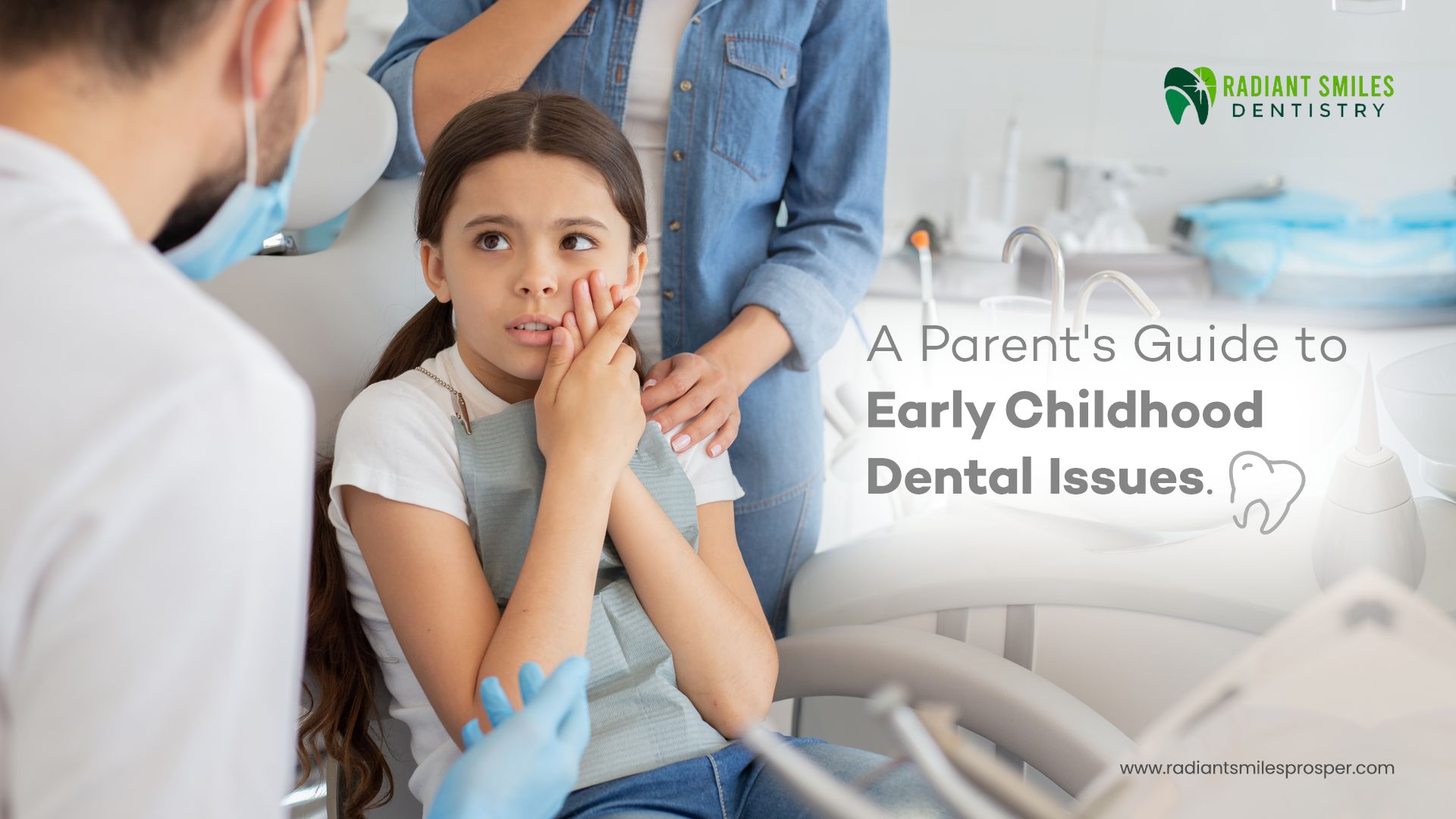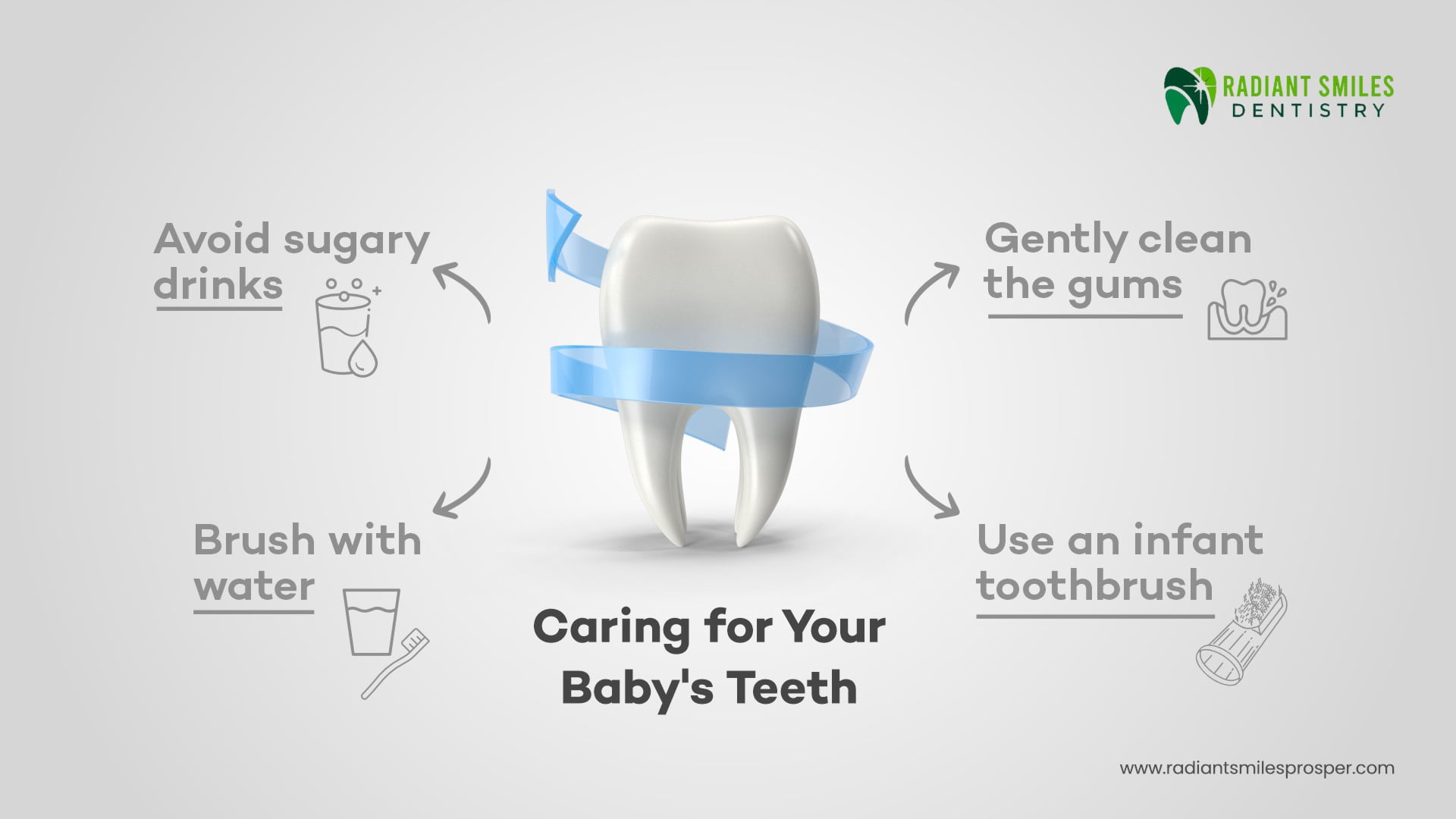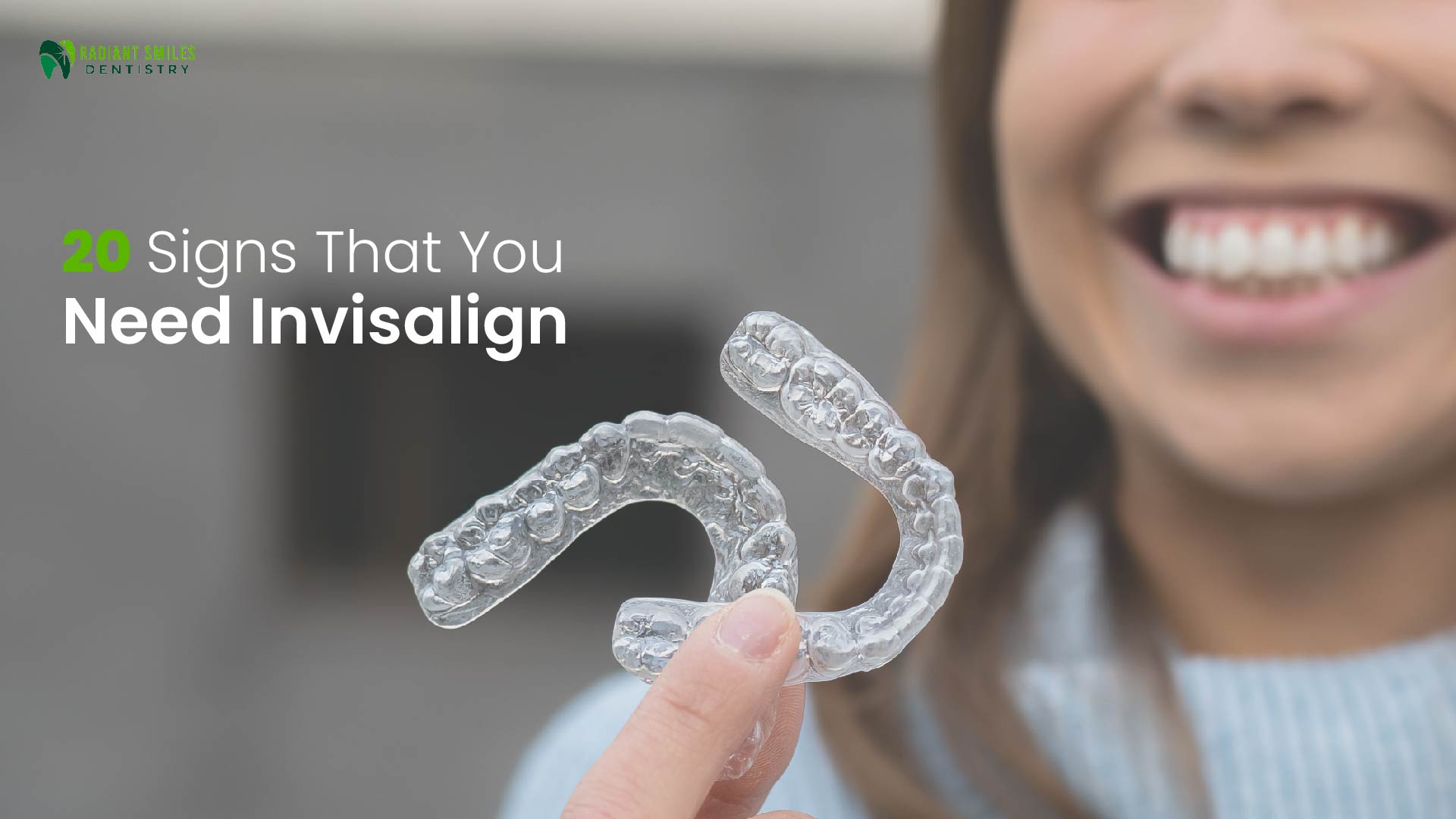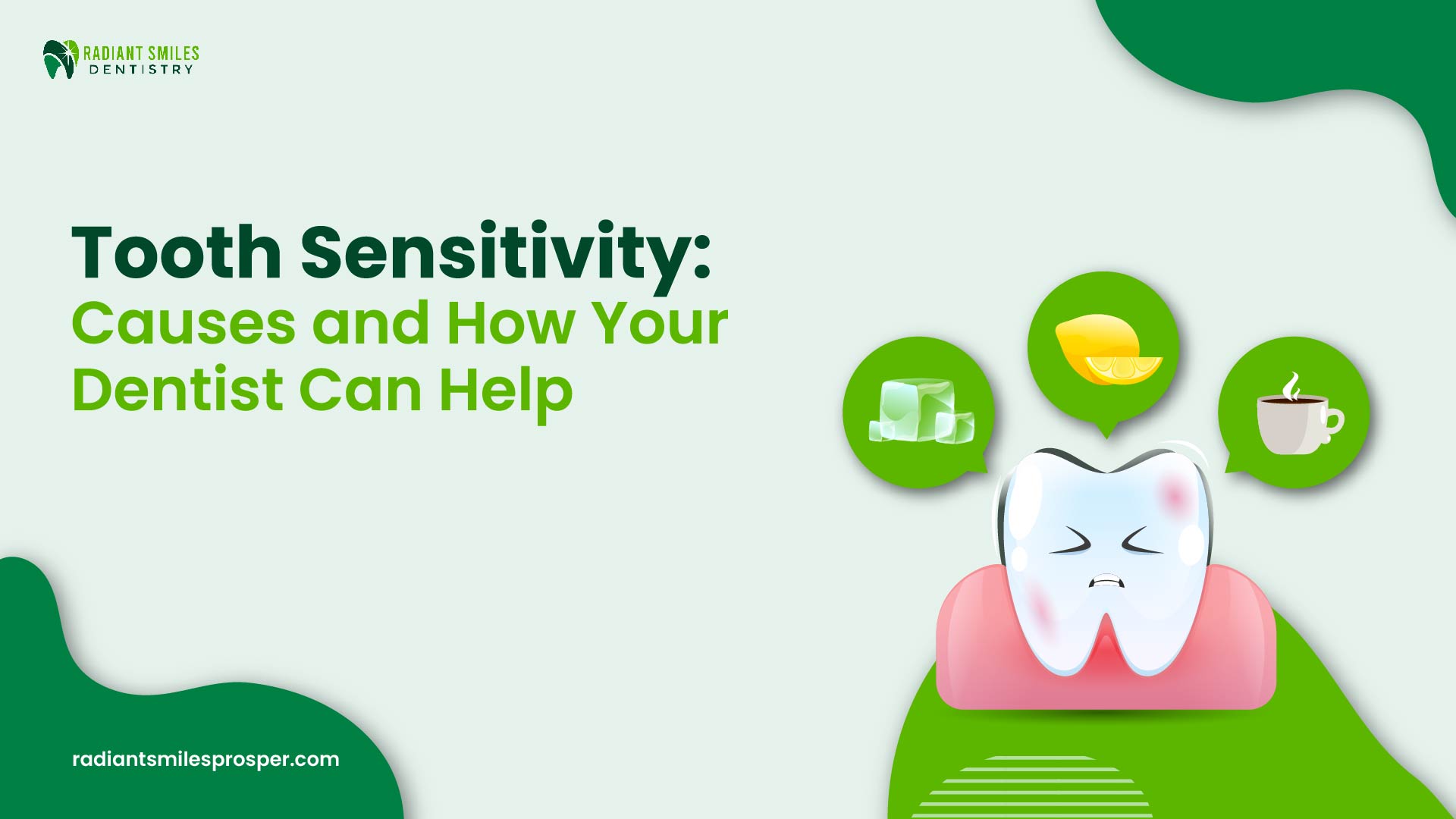Dental veneers are a popular cosmetic option for obtaining a perfect smile,...
A Parent’s Guide To Early Childhood Dental Issues

Parent Guide to Dental Hygiene for Kids – Introduction
Having a child at home is like seeing your heart walk outside your body. That’s such a heartwarming experience of being a parent and watching them grow up each day. However, we can not deny the fact that being a parent is the most challenging journey one could ever embark on. As a parent, we are liable to take care of the best upbringing, imbibing good virtues and fostering best hygiene practices.
We usually pay close attention to their emotional health, mental health, physical health, educational growth and more. But most of the time we forget about their oral hygiene and the best practices to inculcate good oral hygiene habits in their lifestyle.
If dental care does not begin at an early stage of childhood, children are liable to not give it much significance. In their adulthood and later on. Therefore, each parent is liable to take responsibility for their child’s dental health care by maintaining good oral practice for themselves and then initiating their child’s dental care. You can simply begin with the smallest actions, such as cleaning your child’s gum after feeding, and replacing their milk cup with the ceramic cup when they are 1 year old.
Start brushing their teeth once they are 2-3 years old and use fluoride toothpaste for them. And if your toothpaste is not having fluoride then you can use the tape water from your house, as it contains fluoride. However, if you use purified water everywhere in the house, then you can ask your child’s dentist (Pediatric dentist) to provide you with a prescription for fluoride supplements.
Parents have to take care of this as their baby’s everyday accessories gradually become factors that significantly affect their baby’s dental health. Your baby’s teeth could be affected by its bottle and thumb-sucking habits. Therefore, it is advisable to not use any plastic elements and any such milk bottles that contain plastic or related elements. Additionally, thumb-sucking for a longer period of time has the potential to damage your kind’s oral health.
In this blog, we will talk about dental issues and oral hygiene for your child. By reading this blog, you can get to know how to function as a pediatric dentist for your child. Let’s dive deep into the topic below.
The Importance of Early Childhood Dental Care
Early childhood dental care is essential for several reasons. First and foremost, it sets the foundation for lifelong oral hygiene habits. By instilling good dental care practices early on, you are teaching your child the importance of taking care of their teeth and gums. This will have a lasting impact on their oral health as they grow older.
Another significant benefit of early dental care is the prevention of dental issues. Regular visits to the dentist can detect and address any potential problems before they become more serious, such as cavities or gum disease. By identifying these issues early on, you can prevent pain and discomfort for your child and avoid more extensive and costly treatments in the future.
Additionally, maintaining good oral hygiene from a young age can have a positive impact on your child’s overall physical health. Poor oral health has been linked to various chronic diseases, including heart disease and diabetes. By prioritizing early childhood dental care, you are setting your child up for better overall health later in life.
Lastly, promoting good dental habits can boost your child’s confidence and self-esteem. A healthy smile can make them feel more confident in social interactions and improve their overall quality of life.
Caring for Your Baby’s Teeth
Even before your baby’s first tooth emerges, it’s important to start practicing good oral hygiene. Here are some tips for caring for your baby’s teeth:
1) Gently clean the gums
Before your baby’s teeth come in, you can start by gently wiping their gums with a clean, moistened gauze pad or washcloth. This helps remove any bacteria or food particles.
2) Use an infant toothbrush
Once your baby’s first tooth appears, you can start using an infant toothbrush. Choose a soft-bristled brush specifically designed for babies.
3) Brush with water
Initially, you can simply use water to brush your baby’s teeth. As they grow older and can spit out toothpaste, you can introduce a small amount of fluoride toothpaste.
4) Avoid sugary drinks
Never allow your baby to fall asleep with a bottle containing sugary liquids, as this can lead to tooth decay. Stick to water or plain milk instead.
5) Schedule the first dental visit
Consult with your dentist about scheduling your baby’s first dental visit. The first visit should ideally occur within six months after the first tooth appears or by their first birthday.
By following these steps, you can establish a solid foundation for your baby’s dental health and ensure they have a healthy smile as they grow.
Teething and Managing Discomfort
Teething can be a challenging time for both babies and parents. Here are some tips to help manage your baby’s teething discomfort:
- Use a chilled teething ring: A clean, chilled teething ring can provide relief by numbing the gums. Avoid dipping it in sugar, syrup, honey, or other sweet substances.
- Provide appropriate teething toys: Look for teething toys made from safe materials that your baby can chew on to soothe their gums. Make sure they are free from harmful chemicals or small parts that could pose a choking hazard.
- Consult your dentist or physician: If your baby is experiencing persistent or unusually high fever during teething, consult your healthcare professional. Fever is not a normal symptom of teething and may indicate another underlying issue.
Although, it is necessary to remember, every baby is unique, and their teething experience may vary. Therefore, be patient and provide comfort and support to help your baby through this milestone.
The Significance of Baby Teeth
Some parents may wonder why baby teeth are important if they will eventually be replaced by permanent teeth. Baby teeth, also known as primary teeth, play a crucial role in your child’s dental development. Here’s why baby teeth are significant:
- Chewing and speech development: Baby teeth enable your child to chew food properly and develop proper speech patterns. They provide the foundation for their oral function and communication skills.
- Maintaining space for permanent teeth: Baby teeth hold space in the jaws for the permanent teeth that will come in later. Premature loss of baby teeth can lead to spacing issues and misalignment of permanent teeth.
- Facial structure development: Baby teeth help in the development of the facial structure and jaw alignment. They contribute to the proper growth and development of your child’s face.
- Building self-confidence: A healthy smile with well-maintained baby teeth can boost your child’s self-esteem and confidence. It allows them to feel comfortable and confident in social interactions.
Understanding the importance of baby teeth can help you prioritize their care and ensure your child’s dental health is on the right track.
Also Read: Dental Implants: Introduction, Types, Procedure, and Surgery Cost
When to Schedule the First Dental Appointment and What to Expect?
The first dental visit is a crucial milestone in your child’s dental care journey. Here’s what you need to know about scheduling the first dental visit and what to expect during the appointment:
- When to schedule: The American Dental Association recommends scheduling the first dental visit within six months after the eruption of the first tooth or by your child’s first birthday, whichever comes first. Starting early sets the stage for a lifetime of good dental health.
- Preparing for the visit: Before the appointment, gather any relevant medical and dental history, including information about any medications or allergies. Be ready to discuss any concerns or questions you may have about your child’s dental health.
- The dental examination: During the first dental visit, the dentist will perform a comprehensive oral examination. This includes checking for proper growth and development, assessing oral hygiene practices, examining for any injuries or cavities, and evaluating the risk of tooth decay.
- Cleaning and fluoride treatment: The dentist may also clean your child’s teeth and provide fluoride treatment to strengthen the enamel and prevent cavities. They will guide you on proper daily care and oral hygiene practices for your child.
- Education and guidance: The first dental visit is an excellent opportunity for you to learn more about your child’s dental health and receive guidance on topics such as teething, pacifier use, and thumb-sucking habits. The dentist can also discuss common dental injuries and preventive measures.
- Future appointments: Based on your child’s dental health, the dentist will recommend the frequency of future check-ups. Regular dental visits every six months are generally recommended for most children.
Remember, the first dental visit is not only about dental care but also about building a positive and trusting relationship between your child and the dentist. Make the experience enjoyable for your child and reinforce the importance of regular dental check-ups.
Establishing Good Dental Habits for Toddlers and Young Children
As your child grows, it becomes increasingly important to establish and maintain good dental habits. Here are some practical tips for promoting proper dental care habits for toddlers and young children:
- Brushing and flossing: Help your child brush their teeth twice a day using a soft-bristled toothbrush and age-appropriate fluoride toothpaste. Teach them proper brushing techniques and encourage them to spit out toothpaste rather than swallowing it. When their teeth start touching, introduce flossing to remove plaque between teeth.
- Supervise and assist: Children may need assistance and supervision with brushing and flossing until they develop the coordination and dexterity to do it effectively on their own. Be patient and guide them through the process, ensuring they reach all surfaces of their teeth.
- Limit sugary snacks and drinks: Sugary foods and drinks contribute to tooth decay. Encourage a balanced and nutritious diet, limiting the consumption of sugary snacks and beverages. Opt for healthier alternatives like fruits, vegetables, and whole grains.
- Promote regular dental check-ups: Schedule regular dental check-ups every six months for your child. These visits allow the dentist to monitor their oral health, provide professional cleanings, and address any emerging issues promptly.
- Lead by example: Children learn by observing their parents’ behaviors. Set a positive example by practicing good dental habits yourself. Brush and floss your teeth alongside them, emphasizing the importance of oral hygiene.
- By incorporating these habits into your child’s daily routine, you are setting them up for a lifetime of good oral health and helping them develop a positive attitude towards dental care.
Addressing Thumb-Sucking and Pacifier Use
Sucking is a natural reflex in infants and young children. While thumb-sucking and pacifier use can provide comfort, they may also impact dental development. Here are some considerations:
- Potential dental issues: Prolonged thumb-sucking or pacifier use can result in dental problems, such as misalignment of teeth or jaw growth issues. The intensity, duration, and frequency of sucking can influence the likelihood of dental issues.
- Thumb-sucking cessation: Most children naturally stop thumb-sucking between the ages of two and four. If your child continues thumb-sucking beyond this age, consult your dentist for guidance on managing the habit.
- Pacifier use: If your child uses a pacifier, provide a clean one and avoid dipping it in sugar or honey. Limit pacifier use to sleep times and gradually wean them off the pacifier as they get older.
- Positive reinforcement: Instead of punishing or scolding your child for thumb-sucking or pacifier use, offer positive reinforcement and praise when they refrain from these habits. Encourage alternative soothing techniques or provide comfort in other ways.
Preventing Baby Bottle Tooth Decay
Baby bottle tooth decay, also known as early childhood caries, can occur when a baby’s teeth are frequently exposed to sugary liquids. Here are some strategies to prevent baby bottle tooth decay:
- Avoid prolonged bottle-feeding: Do not allow your baby to fall asleep with a bottle containing sugary liquids like milk, formula, or juice. The prolonged exposure to these liquids can lead to tooth decay. Instead, encourage your child to finish their bottle before bedtime and clean their mouth afterward.
- Promote healthy drinking habits: Introduce a cup to your child by their first birthday and encourage them to drink from it instead of a bottle. Limit the consumption of sugary drinks and encourage water as the primary beverage between meals.
- Practice good oral hygiene: Start cleaning your baby’s gums even before the first tooth emerges. As soon as teeth appear, gently brush them with an infant toothbrush and water. Gradually introduce fluoride toothpaste when your child can spit it out.
- Schedule regular dental visits: Regular dental check-ups are essential for monitoring your child’s dental health and addressing any concerns. Consult with your dentist about the recommended frequency of visits based on your child’s individual needs.
By following these preventive measures, you can significantly reduce the risk of baby bottle tooth decay and support your child’s oral health.
Fostering a Positive Dental Experience for Children
Dental visits can sometimes be intimidating for children. As parents, it’s important to create a positive and supportive environment to foster a pleasant dental experience. Here are some tips:
- Choose a child-friendly dentist: Look for a pediatric dentist who specializes in treating children. They are trained to handle the unique needs and anxieties of young patients and create a comfortable environment.
- Prepare your child: Before the dental visit, explain to your child what to expect in a simple and positive manner. Use age-appropriate language and avoid using scary or negative terms.
- Engage in role-playing: Pretend play can help familiarize your child with the dental visit experience. Use toys or stuffed animals to demonstrate what will happen during the appointment. Make it a fun and interactive activity.
- Offer reassurance and support: During the dental visit, stay by your child’s side to offer support and reassurance. Hold their hand or provide comforting words to help them feel secure.
- Reward positive behavior: Admire and reward your child for their cooperation and bravery during the dental visit. This positive attitude helps them create a positive association with dental care.
Each dental visit is an opportunity to build trust and establish a lifelong relationship between your child and their dentist. By creating a positive dental experience, you can help your child develop a positive attitude towards dental care and lay the foundation for ongoing oral health.
Conclusion :
Early childhood dental care is crucial for ensuring your child’s oral health and overall well-being. By prioritizing good dental habits from an early age, you are setting your child up for a lifetime of healthy smiles. Normalize brushing and flossing their teeth, promote a healthy diet, schedule regular dental visits, and foster positive dental experiences.
By doing so, you are investing in your child’s oral health and helping them develop lifelong dental care habits. With your guidance and support, your child will have a bright and healthy smile for years to come.
| Recent Blog Post
The Role of Cosmetic Dentistry in Restoring Confidence After Tooth Loss
Dental veneers are a popular cosmetic option for obtaining a perfect smile,...
Tooth Sensitivity: Causes and How Your Dentist Can Help
Dental veneers are a popular cosmetic option for obtaining a perfect smile,...











